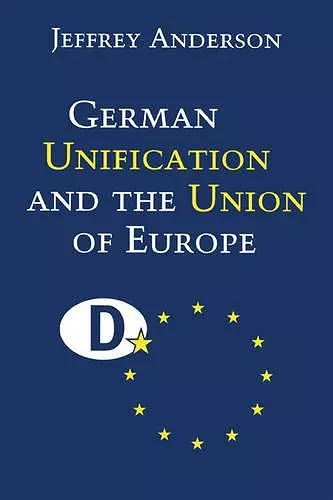German Unification and the Union of Europe
The Domestic Politics of Integration Policy
Format:Paperback
Publisher:Cambridge University Press
Published:10th Jun '99
Currently unavailable, and unfortunately no date known when it will be back
This paperback is available in another edition too:
- Hardback£90.00(9780521643559)

This book explores the effects of Germany's unification in 1990 on its policies toward the European Union.
German Unification and the Union of Europe explores the effects of Germany's unification in 1990 on its policies toward the European Union. Jeffrey Anderson examines the interplay between the domestic politics of unification and the supranational politics of integration, utilising leading theories of political economy, detailed archival research and numerous interviews.German Unification and the Union of Europe discusses some of the most interesting questions in the study of comparative politics and international relations. The book studies the sources of continuity and change in German policy toward the European Union, set in the context of the competing pulls of integration into the EU, and unification of East and West Germany. Employing a framework of analysis premised on the interaction of interests, institutions and ideas, the book asks: how has the domestic politics of unification influenced German policy toward Europe? Why has continuity reigned in some areas, whereas in others significant changes, sometimes reversals, have been registered? What are the implications of this checkered pattern of outcomes for Germany and for Europe? Jeffrey Anderson's book focusses on the political economy issues (such as trade, internal market, energy, and industrial policy) which represent key components of both German domestic politics and Germany's relationship with Europe. Awarded the DAAD 2000 Prize for Distinguished Scholarship in German Studies: Politics and Foreign Policy.
"Jeffery Anderson's study offers a vitual gold mine of new empirical data on the Federal Republic's policies towards the EU. Its meticulous empirical research and careful analysis of concrete case studies makes an important contribution to the growing literature on Germany's role in European integration and will be of inestimable value to scholars and researchers working in the field." German Politics and Society Spring 2001
"the greatest strengths of Anderson's book is that his analytical framework based on interests, institutions, and ideas captures not only such basic contours of German policies toward Europe, but sheds light on the many nuances of change and continunity in different policy sectors over time, and thus allows for a differentiated and dynamic understanding of Germany's role in Europe...It will be indispensable reading for students of German politics, European integration, and comparative public policy in advanced industrial societies." German Studies Review 2002
"Anderson provides solid empirical evidence... Scholars will benefit greatly from the use of his analytic framework, and the arguement will long continue to pose a significant challenge to those who claim that Germany's foreign policy will now be shaped primarily by external forces and its growing power on the European and international scene." Beverly Crawford, International Relations
ISBN: 9780521643900
Dimensions: 229mm x 152mm x 14mm
Weight: 360g
240 pages